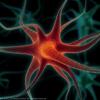Vyvanse is a long-acting stimulant and in some people it causes a very heavy rebound effect (a.k.a. short-term withdrawal syndrome). I loved Vyvanse the few times I took it, but the horrid crash it caused afterwards was simply intolerable. I would feel very sad, anxious, unmotivated, and exhausted whenever the Vyvanse would wear off.
The current theory about how it does this is that dextroamphetamine depletes dopamine (and possibly norepinephrine) far more effectively than cocaine or methylphenidate because unlike those drugs, amphetamines literally force dopamine out of the synaptic vesicles and into the neuronal cytoplasm. From the cytoplasm, they then force dopamine out into the synapse, and block it from re-entering. You don't want a lot of dopamine in the cytoplasm because it harms the brain cells, and because they're damaged, they take a long time to recover and return to normal functioning. Days, not hours.
Moderate doses of MPH (and, if I'm being honest, cocaine) don't cause this sort of short-term brain damage, and so their rebound effects are naturally far milder. Some people don't get any rebound at all from low-to-moderate doses of MPH.
How do you get around this? You can lower the dose of Vyvanse, you could try Adderall XR, you could try Focalin XR (which is more energetic than Concerta), or you could try Provigil (modafinil). Provigil in particular was designed to treat fatigue, but it was later found to be somewhat effective for improving concentration if you're fatigued, sleep deprived, or if you have any form of ADHD or Sluggish Cognitive Tempo. The only warning I'll give you about Provigil is that most docs start you out at a high dose, and many people here on this forum have found that it works far better if you start at 50mg per day or 100mg per day, because this lower dose still works very well, and does not cause you to build up a tolerance.
You said you aren't interested in nootropics, so I won't bore you with talk of stimulating racetams. But since the CILTEP stack isn't actually a nootropic, I certainly will suggest you check it out. It was designed to improve memory, but in most people it actually combats fatigue and improves awakeness more than anything else. It makes you feel energetic all day, sort of like Provigil but with fewer of the classic stimulant side effects like emotional/personality changes and tolerance buildup.
It's really inexpensive too -- I got my first month's supply for $20 from Amazon, and the next few months will each only cost $8. What you do is buy NOW brand Artichoke Extract, and some source of Forskolin. (I prefer NOW Diet Support, which is completely ineffective as a diet pill but makes a great source of forskolin for the CILTEP stack.) You take one forskolin pill in the morning, along with 1-2 artichoke capsules. Then you take another 1-2 artichoke capsules in the afternoon to keep you feeling awake and energetic through the evening. You have to be careful though, if you take too much artichoke too late in the day then you'll have trouble falling asleep.
Edited by jadamgo, 18 February 2013 - 05:12 PM.























































